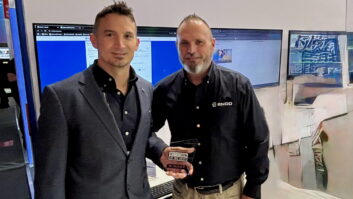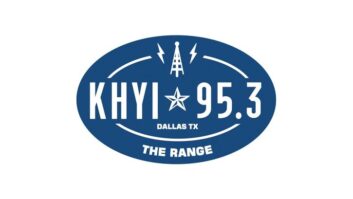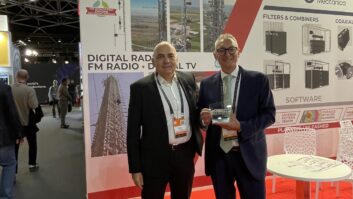
Technical Director Frankie Maranzino adjusts the playlist on the ImmaculateHeartMusic.com streaming automation system. The history of religious broadcasting in America goes back to 1921 when, according to www.christian.com, KDKA(AM) in Pittsburgh aired a local church service.
But as late as 1997, there were only six stations on the air devoted exclusively to Catholic teachings. That’s when Loomis, Calif.-based Immaculate Heart Radio built KIHM(AM) in Reno, Nev., its first outlet serving a Catholic audience. Today, of the 300 or so stations and translators in the United States airing programming geared to Catholics, 33 are owned by Immaculate Heart Radio — 17 AMs, two FMs and 14 translators. All IHR stations are 501(c)(3) nonprofits; all are listener-supported.
“Catholics led the way on radio and TV with Bishop Fulton Sheen in the ’50s and ’60s, but were slow to start radio stations,” said IHR General Manager Dick Jenkins. “The challenge we faced was lack of program availability. EWTN” — a worldwide Catholic network — “got the ball rolling by picking up the best Catholic programming from around the country and making it available on satellite. Then we faced a learning curve. National Public Radio was already an expert on noncommercial pledge drives, charitable remainder trusts, etc. We had some catching up to do.”
Prior to joining IHR in 2010 as a consultant, Jenkins had a 39-year history in broadcasting including a 23-year stint building the religious “K-Love” network from one station to 500 FMs and translators. He retired but was lured back to work at IHR. In order to make his new business plan succeed, he knew that operational costs had to be kept to a minimum. His weapon of choice: AM radio.
“We do have a few stations on FM, but the AM band has worked well for our talk format, so we find AM to be very efficient,” said Doug Sherman, founder and president of IHR since its birth.
“Because of the low cost of acquiring an AM station (about 25 percent of the cost of an equivalent FM signal) and cost-sharing among our stations, we can come in at about $50 an hour to run them. Within three years of start-up, each one of our properties should be able to cover its own expenses. This $50-an-hour figure also helps our listeners plan their pledges. They know that, for example, they can support one hour of programming for a monthly $50 donation.”
Jenkins notes that AM is its “platform of choice out of necessity — the least expensive way to start a station in a market.”
Even though there is little direct competition in local markets for Catholic listeners, Jenkins sees a bigger picture.
“We all compete for the same audience,” he said. “There are not only terrestrial stations, but translators, FMs, the Internet, streaming audio and video. It’s a digital world. Catholic radio is still an unknown entity in many respects, and even people who attend Catholic churches may be unaware of it. That’s a visibility problem we have to solve, and it’ll take time.”

In the lobby of Immaculate Heart Radio, Doug Sherman, left, president and founder of IHR, stands with Dick Jenkins, IHR network general manager.‘MAKING SOCIETY BETTER’
Immaculate Heart Radio creates much of its own programming using recording studios in California, Nevada and Tennessee.
In the Loomis headquarters there are two air-ready studios plus a control room with expanded mixing and distribution functions. The music formats, one of which is contemporary and one of which is sacred music, are automated. The talkshows use Comrex’s Studio Telephone Access Center (STAC) with 12 incoming lines. The hosts send their shows to the network from Ohio, California and Texas via Comrex BRIC-Link. Simian software by BSI is used for time-shifting. Programs are recorded using Adobe Audition.
IHR stations receive their news from Virtual News Center, profiled in our Sept. 10, 2014 issue. But there’s a twist.
“Most non-sectarian stations believe in the saying, ‘If it bleeds, it leads,’” said Jenkins. “That’s not for us. We have instructed Virtual News Center that every newscast should end with a positive story, if possible.
“Life is tough enough. We would rather hear about little Suzy in Des Moines raising money for a wheelchair. This is where culture and truth intersect. We don’t avoid important topics, and we are in favor of freedom of speech, but there’s a question of morality here. People hear name-calling and political whining on the radio all the time, so we try to provide something different.”
IHR and its listeners also believe in charity.
“Research shows that the average person who supports Catholic radio also supports five other causes,” said Jenkins. “These are all values shared by the Catholic Christian ‘tribe.’”
Those values include the political hot button of abortion. “You know, 10,000 people may show up for a pro-life rally, but the local newspaper won’t mention it because it’s not politically correct. That’s a natural for us as people who believe in supporting the lives of the unborn.”

IHR also was a co-founder of the Catholic Radio Association and is an active member. Sherman is chairman of the association, which was founded to help others start Catholic stations. It has played a significant role in doing just that over 18 years, and more are on the way, according to Jenkins.
IHR’s annual budget is about $7.5 million; it employs 24 full-timers at its headquarters. IHR provides its original programming at no cost to any station that wishes to run it, and all programming is commercial-free.
“There are two advantages to that,” said Jenkins. “First, if we’re reading a passage from St. Matthew on the air, we don’t want to come out of that with a spot for a car dealer because it would ruin the moment. Secondly, contributions to our stations are tax-deductible.
“There are more hungry, homeless and sick people who are cared for by the Catholic Church worldwide than any other entity. We just believe in making society better — and that’s one reason why Catholics believe in supporting Catholic radio, to get that message out.”
Immaculate Heart Radio streams its programming via ihradio.com and ImmaculateHeartMusic.com.
Ken Deutsch is now in his 30th year writing for Radio World and its sister publications.







